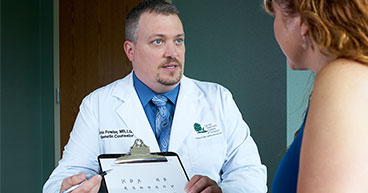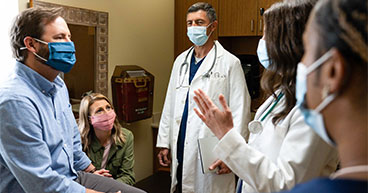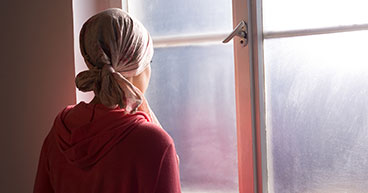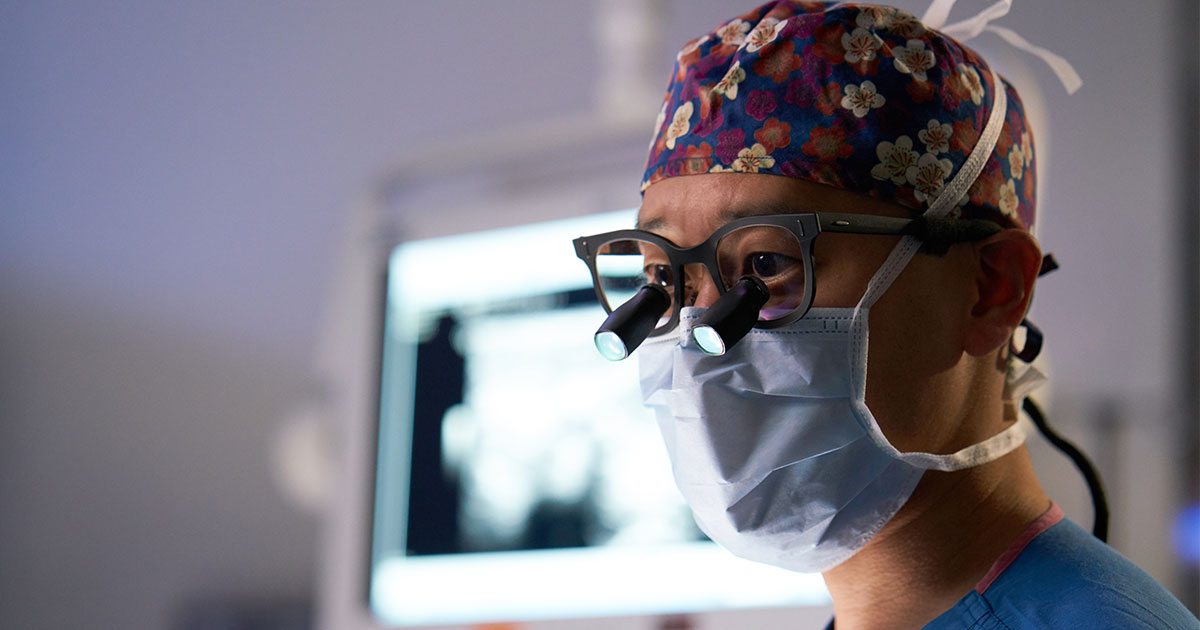
“Is breast reconstruction an option for me?” Of all the questions I get from patients, that's one of the most common. The answer isn’t simple.
Whether you’re a candidate for breast reconstruction after breast cancer surgery, and if so—which type—depends on the type and stage of your breast cancer, your breast cancer treatment, your body type, your expectations, your medical issues, who your breast surgeon is and other considerations. It may take a team of experts to help guide you through the choices that are right for you.
As a plastic reconstruction surgeon at Cancer Treatment Centers of America® (CTCA), I regularly guide breast cancer patients through their breast reconstruction options.
While it’s impossible to give you all the information you may need in one blog post, the goal of this article is to help you understand some of the variables and choices surrounding breast reconstruction after breast cancer surgery so that you’re better prepared to meet with surgeons to discuss your particular circumstances and options. I’ll cover:
- Common misconceptions about breast reconstruction
- Variables that affect whether you qualify for breast reconstruction
- First steps: Meeting with your surgeons
- Breast reconstruction choices
- Questions to ask your doctors about breast reconstruction
- Getting a second opinion
If you’d like to talk with someone on our team about your breast reconstruction options, or if you’d like to get a second opinion for breast cancer, call us or chat online with a member of our team to schedule an appointment.
Common misconceptions about breast reconstruction after breast cancer
First, I want to make some important points in addressing a few common misconceptions patients often have surrounding breast reconstruction.
- Many women aren’t aware that breast reconstruction is a multi-stage process. When you hear terms like “immediate breast reconstruction”, it’s easy to form the opinion that everything’s done in one surgery. But immediate reconstruction is a misnomer. “Immediate” simply implies that we start the process immediately after a mastectomy or lumpectomy. It’s usually the first step of several, but that varies with the type of reconstruction and the woman’s expectations. (Delayed reconstruction simply means we start the process sometime post-mastectomy.)
- Many women mistakenly think health insurance won’t cover reconstruction because plastic surgery is viewed as cosmetic. But the federal Women's Health and Cancer Rights Act of 1998 (WHCRA) requires most health insurance plans to cover breast reconstruction surgery after a mastectomy when the mastectomy is a covered procedure. Verify your benefits with your plan administrator.
- Breast reconstruction is a lifelong process. Some women mistakenly believe they can get an implant and live with the same implant forever. They’re unaware that there are often problems with implants, especially if patients receive radiation therapy after reconstruction surgery.
- Implants are man-made devices. They can break, and they require maintenance. You may need adjustments or exchanges over the years because implants don’t age like natural breasts. I often tell women they'll probably end up seeing their plastic surgeon more than any other surgeon after breast cancer because we end up revising or repairing issues down the road.
Variables that affect whether you qualify for breast reconstruction
The variables surrounding whether you qualify for breast reconstruction surgery are tied to your specific circumstances. They include:
How urgent surgery is to address the needs of your breast cancer
Do you have time to consult with a plastic surgeon to thoroughly investigate your options? Do you have all the information you need about whether you’ll need post-surgery treatment, and if so—what type? If not, you may want to delay plans for reconstruction until a later date. Treating your cancer should be the priority.
The stage of your breast cancer
The stage of your breast cancer affects your treatment options, and treatment options affect the reconstruction process and outcome. Having chemotherapy or radiation therapy after surgery may harm or change the reconstruction. Patients who receive radiation after an implant often end up with tightness around the implant—an expected complication known as capsular contracture. When this happens, the surgeon has to remove the implant and replace it with non-radiated tissue. This is a more complex form of reconstruction that’s not widely offered.
Your general health
Having some chronic medical conditions, such as heart disease or diabetes, may disqualify you from plastic surgery. Smoking and nicotine use increase the risk of complications of surgery. If you’re a smoker, you may have to quit smoking for a period of time before surgery. In that case, delayed reconstruction may be an option for you.
Your expectations about how your breasts will look after reconstruction
Reconstructed breasts won’t have the same look and feel of your natural breasts. Will you be comfortable with scarring that results from surgeries? Your plastic surgeon should show you photos of women who’ve undergone a similar process to give you a realistic idea of what to expect.
Recovery time
Reconstructive surgery requires a longer recovery period compared to a mastectomy or lumpectomy alone. How long recovery takes depends on the type of reconstruction and how many steps are needed. Weigh potential consequences and the amount of time off you may need for recovery.
First steps: Meeting with your surgeons

Determining whether you’re a candidate for breast reconstruction, and if so, which options you qualify for, is often a multi-step process that involves some back-and-forth among you, your breast surgeon, your plastic surgeon and the rest of your cancer care team.
Patients should see a breast cancer surgeon before consulting with a plastic surgeon for reconstruction. The breast surgeon should have a pretty clear recommendation about whether you need a mastectomy or a lumpectomy. This may be a clinical judgement that changes depending on where you go for treatment or which doctor you see.
The type of surgery chosen is often a personal decision for the patient. Sometimes a woman has a very small tumor that could be removed with a lumpectomy, but she doesn’t want to deal with radiation and lifelong mammographic surveillance. Or, she may have anxiety about the potential for a cancer recurrence. Genetic mutations, such as BRCA1 and BRCA2 that are known to increase the lifetime risk of breast cancer, are appropriate medical indications for prophylactic mastectomies. A woman with one of these genetic mutations may choose to have a bilateral mastectomy for her own peace of mind.
Your surgeon and medical oncologist should also have a general idea of whether you’ll need treatment after surgery, and if so, what kind. But it’s not unusual for patients to still have some unknowns at this stage of the process. Still, it’s important to be informed of the entire process, because of the impact treatment has on the reconstructive process and outcome.
Meeting with a plastic and reconstructive surgeon
After meeting with your breast surgeon, you’ll meet with your plastic and reconstructive surgeon. If there’s no medical reason precluding you from reconstruction surgery, the plastic surgeon may recommend either autologous reconstruction (a type of reconstruction that uses your own tissue instead of an implant) or implant-based reconstruction.
Your reconstruction options change depending on whether you’re having a lumpectomy vs. mastectomy. Sometimes the type of reconstruction a woman wants may influence the decision for a different kind of tumor operation. The decision often requires several back-and-forth conversations between the woman and her surgeons.
Consider seeking multiple opinions before you make a decision. Some surgeons only perform one type of reconstructive surgery. If that’s the only surgeon you see, you may not get all the information you need to make a decision that’s right for you.
Types of breast reconstruction
The two primary categories of breast reconstruction after mastectomy are implant-based reconstruction and autologous reconstruction. For each category, surgeons may use a variety of specific techniques to perform the reconstruction.
It’s beyond the scope of this article to discuss these techniques in detail, but if you’d like to learn more about them, I recommend you go to the Types of Breast Reconstruction page of the American Society of Plastic Surgeons website.
Autologous reconstruction
Autologous reconstruction is a type of reconstruction using the patient’s own tissue, taken from somewhere else on her body, and transplanting it to create a new breast. It’s also referred to as “flap reconstruction.” The most common donor site (or flap) is the lower tummy, but there may be alternative sites, such as the inner thigh or buttocks.
Some women don’t qualify for autologous reconstruction immediately after breast surgery because of the unknowns surrounding cancer treatment. However, treatment after surgery doesn’t necessarily rule out this option. We can start with an implant as a temporary reconstruction, and then switch it out to your own tissue at a later date.
Women with certain medical conditions and very thin women without extra body fat may not qualify for this type of reconstruction.
Autologous reconstruction requires more recovery time compared to implant reconstruction, but it may create a better long-term result for these reasons:
- It often more closely matches natural breasts.
- It's warm, and it has good blood flow.
- It doesn’t need as much maintenance over time when compared to an implant.
- It can soften the reconstructed breast and reverse some of the damage that radiation may have caused.
Many community plastic surgeons don’t offer microsurgical autologous reconstruction. You may have to go to a larger cancer hospital like CTCA to find plastic reconstructive surgeons who are experienced in performing this type of microsurgery and in monitoring blood flow after the tissue transfer.
Reconstruction with breast implants
Implant-based reconstruction uses various surgical techniques to replace a breast form created from saline or silicone gel. This process may be performed immediately after a mastectomy, or it may be delayed until a later time.
Some disqualifiers for reconstruction with breast implants may include prior radiation therapy treatment, extensive scar tissue on the breast and current nicotine use.
Are breast implants safe?
Many women fear breast implants aren’t safe because of issues in the 1990s with silicone implant leakage and rupture.
Breast implants are among the most extensively studied and safest medical devices on the market today. All implants have to undergo rigorous testing to receive approval by the U.S. Food & Drug Administration (FDA). Implants do need monitoring and may eventually need to be replaced. Depending on the type of implant, about 1 percent rupture per year.
That said, a small number of women may have an adverse reaction to the implants because they're made of foreign materials. Some women report autoimmune-type symptoms that may or may not be associated with breast implants themselves. Researchers haven’t been able to prove the connection in population studies.
More recently, women have been concerned about breast implant-associated anaplastic large cell lymphoma (BIA-ALCL), a very rare type of lymphoma that has been associated with a specific type of textured breast implant. That implant was recalled by the FDA about two years ago.
Questions to ask your doctor about breast reconstruction
Many breast cancer patients who want to have breast reconstruction are unaware of the importance of the working relationship between their breast surgeon and their plastic surgeon.
Ask your surgeons about their experience working together. Ideally, they should take a team approach, working closely together to plan your surgeries. It’s possible—but not always easy—for this to happen in a community health care setting. Typically, going to a cancer center such as CTCA for surgery and treatment provides the advantage of having surgeons and other cancer experts working closely together on a regular basis, all under one roof.
Other questions to ask your doctors include:
- Are you comfortable performing both implant-based and autologous reconstruction?
- How many of each type of surgery have you performed?
- Which technique are you recommending for me?
- Can you show me photos and examples of outcomes of this technique?
- What are the potential risks and side effects for this procedure?
- What are your complication rates?
- Will my treatment affect reconstruction?
It’s also important to ask yourself how comfortable you are with losing your breasts. Some women are totally fine with it because it's not an important part of their identity, and having a simpler process to get through breast cancer is appealing to them.
Others are deeply connected to their breasts and are willing to undergo multiple procedures and have multiple additional scars to achieve or restore what they originally had. Knowing your priorities is extremely important.
Breast reconstruction is a highly personalized surgery. I believe surgeons should remain unbiased and non-judgmental when counseling patients through this difficult journey. It’s not our role to tell women which reconstruction they should or shouldn’t undergo, but we can offer an opinion while taking into account their personal and cancer-related variables. I strive to provide honest, reasonable expectations for each type of reconstruction, empowering women to make informed decisions that are appropriate for them.
Consider getting a second opinion
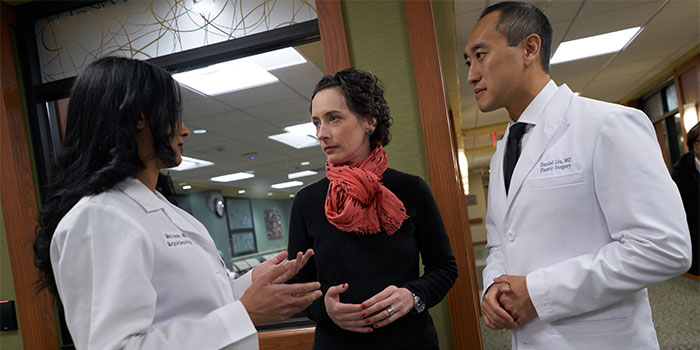
Consider getting a second opinion or even several opinions to be sure you’re comfortable with your surgical team and that you’re getting the information you need to make a decision that’s right for you.
Cancer patients in general come to CTCA for a second opinion and treatment because we provide expert, personalized cancer care with an integrative, patient-centered approach. We only treat cancer at CTCA, and our providers work together to create a plan based on each patient’s personal needs and goals.
When it comes to patients interested in breast reconstruction surgery, two groups typically come to CTCA for a second opinion:
The majority are newly-diagnosed with breast cancer. They’ve often already met with a group of doctors who’ve made a recommendation, and they want our opinion on the plan. We often concur with the original plan. But sometimes, because we’re a comprehensive oncology hospital, we may be able to offer an option their home providers don’t.
Others have already had breast reconstruction elsewhere and are unhappy with the results for some reason. Many women end up living with reconstruction they aren’t happy with because they don't know that options are available to help them. But our team of plastic surgeons is experienced in many reconstructive techniques that may be used to repair unsatisfactory reconstructions.
There’s no quick solution or easy answer to whether you qualify for breast reconstruction after breast cancer, and if so, what choices are appropriate for you. It may take several discussions with your doctors about your specific situation and needs. But make sure you keep having those discussions until you get the information you need to make a decision you’re comfortable with.
If you’d like to talk with someone on our team about your breast reconstruction options, or if you’d like to get a second opinion for breast cancer, call us or chat online with a member of our team to schedule an appointment.

